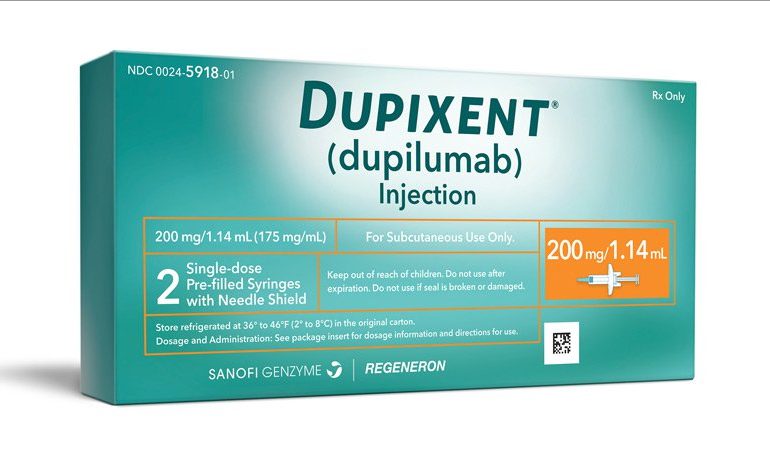Source: Thailand Medical News Oct 26, 2019 6 years, 2 months, 1 week, 7 hours, 16 minutes ago
New findings from the LIBERTY ASTHMA QUEST trial show that add-on
dupilumab (
Dupixent) showed symptomatic benefit for patients with both early-onset and later-onset uncontrolled
asthma.

In trial data published in the Chest Journal, the interleukin 4 and 13 (IL-4; IL-13) targeting monoclonal antibody showed an associated reduction of severe exacerbations and improved lung function in patients with patients both 40 years and younger (early-onset
asthma), and older than 40 years (late-onset
asthma). The subgroup assessment of the LIBERTY
ASTHMA QUEST study, which observed
dupilumab 200 mg or 300 mg as an add-on therapy taken every 2 weeks versus placebo, determined both younger and older patients with
asthma can benefit from the biologic.
Researchers, led by Dr Mario Castro from the University Of Arizona College of Medicine, Tucson analyzed the annualized rates of severe exacerbations among observed patients during the 52-week treatment period in the phase 3 study. The team used negative binomial regression models, as well as change from baseline in pre-bronchodilator forced expiratory volume at 1 second (FEV
1) at weeks 12 and 52, to achieve understanding how
dupilumab treats exacerbation rates and lung function among severe
asthma patients.
The initial LIBERT
ASTHMA QUEST findings indicated patients with elevated type 2 biomarkers at baseline as per blood eosinophils ≥150 cells/mcL or fractional exhaled nitric oxide (FeNO) ≥ 25 ppb. Investigators conducted this analysis to assess the influence of age at asthma onset on the disease’s course, associated comorbidities, and treatment response.
Individuals with later-onset
asthma reported a lower mean pre-bronchodilatory FEV
1 (1.52 L) than patients with early-onset asthma (1.88 L), as well as a lesser rate of ongoing atopic condition (71.1% vs 86.6%). The patient groups reported similar baseline mean severe annual exacerbations per patient (2.12 vs 2.08), median levels of blood eosinophils (270 cells/mcL vs 250 cells/mcL), and FeNO (26 ppb vs 24 ppb).
With 200 mg
dupilumab versus placebo, patients reported a 38.1% reduction in severe exacerbations (
P = .0009) in early-onset
asthma, and a 63.7% reduction in severe exacerbations (
P <.0001) in late-onset
asthma<
/span>.
With 300 mg dupilumab versus placebo, patients reported a 37.3% reduction in severe exacerbations (P = .0007) in early-onset asthma, and a 68.5% reduction in severe exacerbations (P <.0001) in late-onset asthma.
At week 12, dupilumab 200 mg and 300 mg, respectively, significantly improved FEV1 by 0.13 L (P <.0001) and 0.11 L (P = .0005) in the early-onset patient group and by 0.14 L (P = .003) and 0.17 L (P = .0003) in the late-onset patient group, versus placebo.
Researchers observed maintained improvements in pre-bronchodilator FEV1 at 52 weeks (P <.05). The most common frequent adverse event was injection site reaction, occuring in 1%% and 5% of the treated patient groups.
The research team concluded dupilumab reduced severe exacerbations and improved lung function in patients with uncontrolled, moderate-to-severe early-onset and late-onset asthma. The drug was generally well tolerated, and was associated with a numerically greater rate of severe exacerbation reductions among late-onset patients.
The subgroup LIBERTY ASTHMA QUEST findings come in the same year as another assessment which showed patients both with and without comorbid allergic rhinitis, a common accompanying condition for patients with type 2 inflammation asthma also reported reductions in severe asthma exacerbations and improved lung function.
Dr Monica Kraft from Department of Medicine chair at the University of Arizona College of Medicine Tucson,co co-author highlighted the growing benefit of add-on biologic therapy designed to target the key pathways of allergic asthma and commented to Thailand Medical News during an interview, “I think it's a great time to be in the asthma care arena, because you have choices for patients we didn't have before,” Kraft said. “We still have work to do. You know, we're not done. This whole non-type 2 asthma is a big unmet need.”
The Liberty Asthma QUEST is a phase 3, multinational, multicenter, randomized, double-blind, placebo-controlled, parallel-group trial (NCT02414854) in patients with persistent asthma who are receiving continuous treatment with inhaled corticosteroids (ICS) plus one or two other asthma controller medicines.
Reference :DUPILUMAB REDUCES SEVERE ASTHMA EXACERBATION RATE AND IMPROVES LUNG FUNCTION REGARDLESS OF AGE AT ONSET OF ASTHMA: THE LIBERTY ASTHMA QUEST STUDY Mario Castro, MD, Nicola Hanania, Santiago Quirce, Lawrence Sher, Jorge Maspero, Megan Rice, Michel Djandji, Mark Ballard, Paul Rowe, Yamo Deniz, Ariel Teper, Chest Journal
DOI: https://doi.org/10.1016/j.chest.2019.08.870 